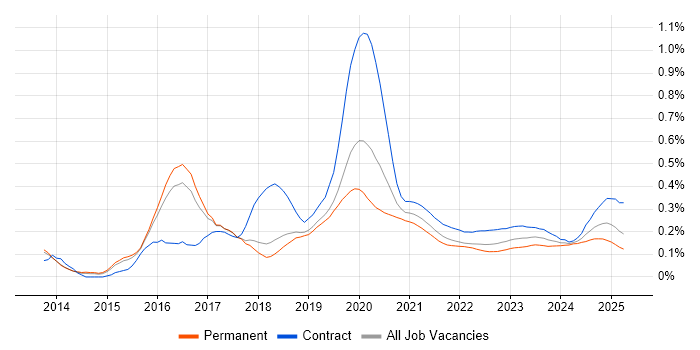Microsoft 365 Engineer (M365 Engineer)
UK > Work from Home
The median Microsoft 365 Engineer (M365 Engineer) salary for remote or hybrid work is £48,000 per year, according to job vacancies posted during the 6 months leading to 4 May 2025.
The table below provides salary benchmarking and summary statistics, comparing them to the same period in the previous two years.
|
|
6 months to
4 May 2025 |
Same period 2024 |
Same period 2023 |
| Rank |
388 |
537 |
627 |
| Rank change year-on-year |
+149 |
+90 |
+126 |
| Permanent jobs requiring a Microsoft 365 Engineer |
27 |
46 |
49 |
| As % of all permanent jobs with a WFH option |
0.18% |
0.14% |
0.12% |
| As % of the Job Titles category |
0.19% |
0.14% |
0.12% |
| Number of salaries quoted |
25 |
43 |
44 |
| 10th Percentile |
£38,250 |
£36,250 |
£35,975 |
| 25th Percentile |
£41,250 |
£40,499 |
£39,375 |
| Median annual salary (50th Percentile) |
£48,000 |
£52,500 |
£52,036 |
| Median % change year-on-year |
-8.57% |
+0.89% |
+15.64% |
| 75th Percentile |
£63,750 |
£65,000 |
£58,750 |
| 90th Percentile |
£71,000 |
£70,000 |
£68,500 |
| UK median annual salary |
£50,000 |
£45,000 |
£56,750 |
| % change year-on-year |
+11.11% |
-20.70% |
+26.11% |
For comparison with the information above, the following table provides summary statistics for all permanent IT job vacancies with WFH or hybrid options. Most job vacancies include a discernible job title that can be normalized. As such, the figures in the second row provide an indication of the number of permanent jobs in our overall sample.
| Permanent vacancies in Work from Home with a recognized job title |
13,910 |
32,483 |
40,831 |
| % of permanent jobs with a recognized job title |
90.78% |
96.00% |
96.05% |
| Number of salaries quoted |
9,940 |
24,937 |
29,014 |
| 10th Percentile |
£30,000 |
£33,081 |
£36,541 |
| 25th Percentile |
£43,750 |
£42,500 |
£47,393 |
| Median annual salary (50th Percentile) |
£60,000 |
£56,000 |
£62,500 |
| Median % change year-on-year |
+7.14% |
-10.40% |
+4.17% |
| 75th Percentile |
£77,500 |
£75,000 |
£81,250 |
| 90th Percentile |
£100,000 |
£92,500 |
£100,000 |
| UK median annual salary |
£57,500 |
£52,550 |
£60,000 |
| % change year-on-year |
+9.42% |
-12.42% |
- |

